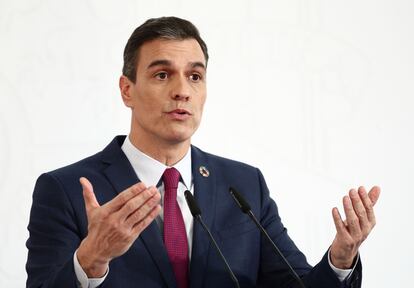Spain’s PM opens the door to a new law covering the Crown, in a bid to further modernize the monarchy
Pedro Sánchez held a press conference on Tuesday to offer a summary of his coalition government’s achievements over the last year, citing an internal report that found that 23% of its commitments had been met

Speaking during a press conference on Tuesday, Spain’s Prime Minister Pedro Sánchez offered a summary of his government’s achievements over the past year, citing a report prepared by the seat of power, La Moncloa, and backed by a group of a dozen or so experts that concludes that of 1,238 commitments, 23.4% have been achieved and a further 90% are underway.
During the Socialist Party (PSOE) leader’s lengthy appearance today, he stated that the government – a coalition with junior partner Unidas Podemos – is working on a project to continue the modernization of the Spanish monarchy that has been put in motion by King Felipe VI. Questioned by reporters, Sánchez also left open the possibility of a new law that would cover the Crown, although he did not go into more detail. “We are going step by step,” the prime minister said, describing the king’s Christmas Eve speech this year as “brave.” There was much expectation ahead of the traditional televised appearance by the monarch on December 24 given the allegations of financial impropriety that have been mounting this year against his father, emeritus king Juan Carlos I.
The king wants a constitutional monarchy that is adapted to 21st-century SpainPrime Minister Sánchez
The prime minister opened the door to new developments regarding the monarchy in the coming months, but also stopped short of giving more details ahead of La Zarzuela royal household confirming what steps would be taken.
“The king wants a constitutional monarchy that is adapted to 21st-century Spain,” Sánchez said on Tuesday. “Renewal, accountability… that’s where Felipe VI is working. We are going step by step. And you will be getting more information about how this road map for the renewal of the crown in terms of transparency and leading by example as it materializes,” he added.
The prime minister also sought to play down reports of tensions between his party and Unidas Podemos, and aimed to convey a clear message in response to a number of questions: that the coalition would not be breaking up, and that he has no intention of trying to govern alone – something that would be incredibly difficult without the support of his junior partner. In fact, the coalition itself already lacks a working majority in Spain’s lower house of parliament, the Congress of Deputies, meaning that votes from other parties are needed in order to pass legislation.
“This is a coalition government that is seeking to last over time,” he said.
The prime minister also discussed the decision to freeze Spain’s minimum wage until an improvement in the country’s economy is seen. This is a compromise between two positions, with Unidas Podemos calling for a 0.9% rise and a complete freeze in 2021 advocated by Economy Minister Nadia Calviño.
“We have raised the minimum wage by 29% in two years,” Sánchez stated. “No other country has faced such a rise, and in a scenario of low inflation. The minimum wage in Spain is 42% of the average salary. In Germany it’s 43%. Why have pensions and civil service wages gone up 0.9% and not the minimum wage? Because in the latter case it is the employer that has to make the effort, and right now, in many cases, they need this relief in order to survive. Our country’s GDP is going to drop by two digits. We have to focus all of our objectives on saving lives, companies and jobs,” he said, in reference to the effect of the ongoing coronavirus crisis.
Pardons for jailed Catalan leaders
Speaking on Tuesday, Spanish Prime Minister Pedro Sánchez suggested that his Cabinet could issue pardons for the nine pro-independence leaders who were imprisoned for their role in the Catalan secessionist drive of 2017 after being found guilty in October 2019 of offenses including sedition and misappropriation of public funds.
“This is a government that, from the start, has not hidden its intentions,” Sánchez said during his press conference at which he offered a summary of the past year. “This government is clearly committed to reuniting, reconciliation and social harmony in Catalonia, and between Catalonia and the rest of Spain.”
In reference to the independence drive, which took place under the previous government, led by the conservative Popular Party’s Mariano Rajoy, Sánchez said that “when we talk about Catalonia, none of us are free from blame. No one is free from blame. We have all made mistakes. And what we have to do is learn from those mistakes, look forward, and be able to find a space where we can reunite.”
English version by Simon Hunter.
Tu suscripción se está usando en otro dispositivo
¿Quieres añadir otro usuario a tu suscripción?
Si continúas leyendo en este dispositivo, no se podrá leer en el otro.
FlechaTu suscripción se está usando en otro dispositivo y solo puedes acceder a EL PAÍS desde un dispositivo a la vez.
Si quieres compartir tu cuenta, cambia tu suscripción a la modalidad Premium, así podrás añadir otro usuario. Cada uno accederá con su propia cuenta de email, lo que os permitirá personalizar vuestra experiencia en EL PAÍS.
¿Tienes una suscripción de empresa? Accede aquí para contratar más cuentas.
En el caso de no saber quién está usando tu cuenta, te recomendamos cambiar tu contraseña aquí.
Si decides continuar compartiendo tu cuenta, este mensaje se mostrará en tu dispositivo y en el de la otra persona que está usando tu cuenta de forma indefinida, afectando a tu experiencia de lectura. Puedes consultar aquí los términos y condiciones de la suscripción digital.








































